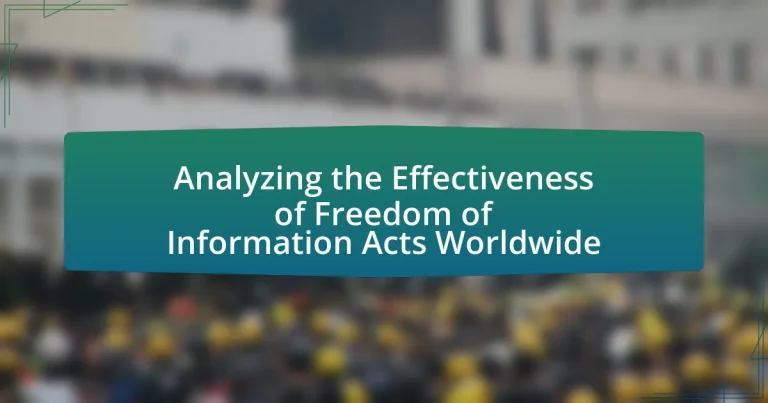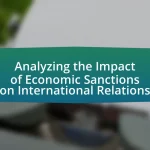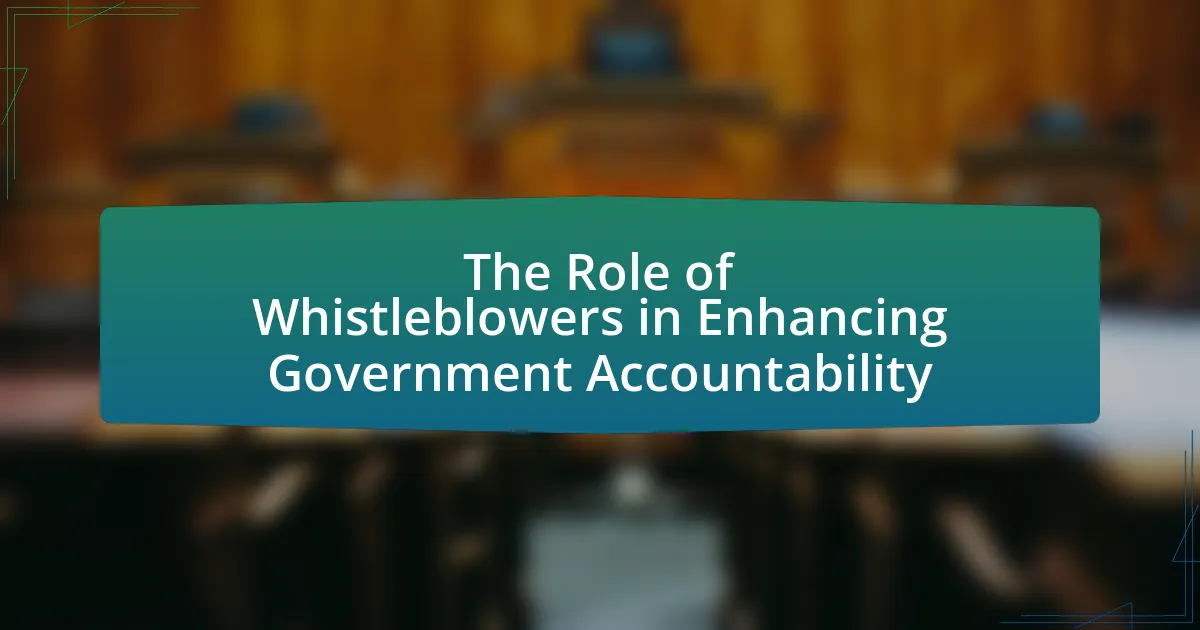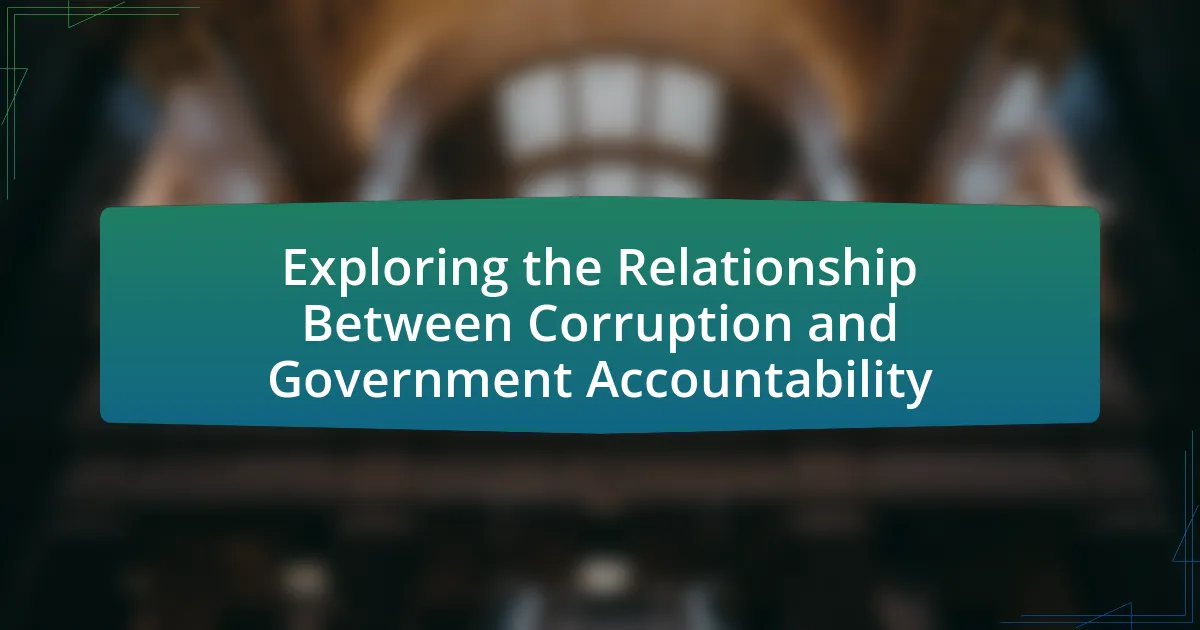Freedom of Information Acts (FOIAs) are laws that enable public access to government-held information, promoting transparency and accountability. This article analyzes the effectiveness of FOIAs worldwide, examining their purpose, global functioning, key components, and the challenges faced in implementation. It highlights the importance of FOIAs for democracy, the role of public awareness, and the impact of cultural attitudes on transparency demands. Additionally, the article discusses best practices for enhancing FOIA effectiveness, successful measures from model countries like Sweden and Canada, and practical steps citizens can take to utilize these acts effectively.
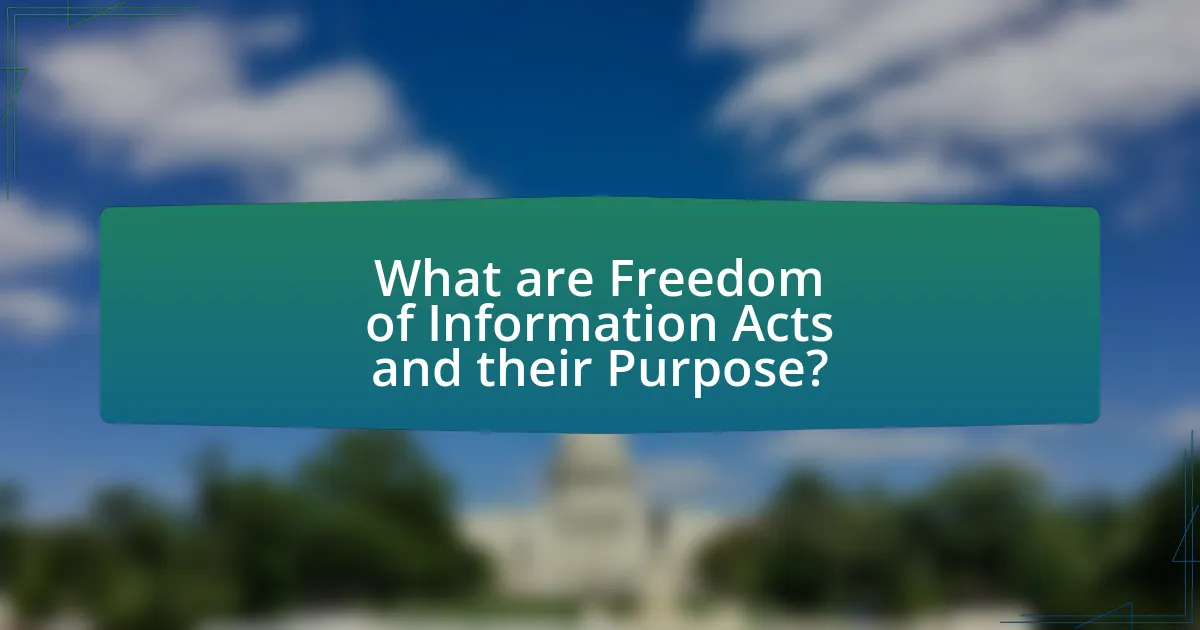
What are Freedom of Information Acts and their Purpose?
Freedom of Information Acts (FOIAs) are laws that grant the public the right to access information held by government agencies. Their primary purpose is to promote transparency and accountability in government by allowing citizens to request and obtain records, thereby enabling informed participation in democratic processes. For instance, the United States FOIA, enacted in 1966, allows individuals to request access to federal agency records, reinforcing the principle that government information should be accessible to the public. This access helps to uncover government actions, fostering a culture of openness and trust between citizens and their government.
How do Freedom of Information Acts function globally?
Freedom of Information Acts (FOIAs) function globally by providing legal frameworks that allow individuals to request access to government-held information. These acts vary in scope and implementation across countries, with some nations, like Sweden, having robust laws that promote transparency, while others, such as the United States, have specific exemptions that limit access to sensitive information. For instance, the U.S. FOIA, enacted in 1966, mandates federal agencies to disclose information unless it falls under certain exemptions, such as national security or personal privacy. In contrast, countries like Canada have adopted a more comprehensive approach, allowing broader access and emphasizing proactive disclosure. The effectiveness of FOIAs is often measured by the responsiveness of government agencies, the clarity of the laws, and the public’s awareness of their rights, with studies indicating that countries with stronger enforcement mechanisms tend to have higher rates of compliance and public trust.
What are the key components of Freedom of Information Acts?
The key components of Freedom of Information Acts include the right to access information held by public authorities, the obligation of these authorities to disclose information proactively, and the establishment of procedures for requesting information. These acts typically define the scope of information covered, outline exemptions for sensitive data, and provide mechanisms for appeals if requests are denied. For instance, the United States Freedom of Information Act, enacted in 1966, mandates federal agencies to make records available unless they fall under specific exemptions, thereby promoting transparency and accountability in government operations.
How do these components vary across different countries?
Freedom of Information Acts (FOIAs) vary significantly across different countries in terms of scope, accessibility, and enforcement mechanisms. For instance, countries like Sweden and Finland have robust FOIAs that promote transparency and allow citizens extensive access to government documents, supported by strong legal frameworks and proactive disclosure practices. In contrast, nations such as China and Russia impose strict limitations on information access, often citing national security or public order as justifications for withholding information, resulting in minimal public engagement and transparency. According to the Global Right to Information Rating, Sweden ranks highest with a score of 139 out of 150, while China scores only 12, illustrating the stark differences in FOIA effectiveness and implementation worldwide.
Why are Freedom of Information Acts important for democracy?
Freedom of Information Acts (FOIAs) are crucial for democracy because they promote transparency and accountability in government. By allowing citizens to access information held by public authorities, FOIAs empower individuals to scrutinize government actions, thereby fostering informed public participation in the democratic process. For instance, studies have shown that countries with robust FOIA frameworks tend to have higher levels of citizen engagement and trust in government institutions. This is evidenced by the 2019 Global Right to Information Rating, which indicated that nations with effective FOIAs, such as Sweden and Canada, exhibit stronger democratic practices and citizen satisfaction.
What role do they play in promoting transparency?
Freedom of Information Acts (FOIAs) play a crucial role in promoting transparency by granting the public access to government-held information. This access enables citizens to scrutinize government actions, fostering accountability and reducing corruption. For instance, studies have shown that countries with robust FOIAs experience higher levels of public trust in government, as citizens can verify the information and decisions made by public officials. Additionally, FOIAs often lead to the release of data that can inform public debate and policy-making, further enhancing democratic engagement.
How do they empower citizens and civil society?
Freedom of Information Acts (FOIAs) empower citizens and civil society by granting them the legal right to access government-held information, thereby promoting transparency and accountability. This access enables individuals and organizations to scrutinize government actions, participate in public discourse, and advocate for their rights. For instance, studies have shown that countries with robust FOIAs experience higher levels of civic engagement and trust in government, as citizens can hold officials accountable for their decisions and policies.
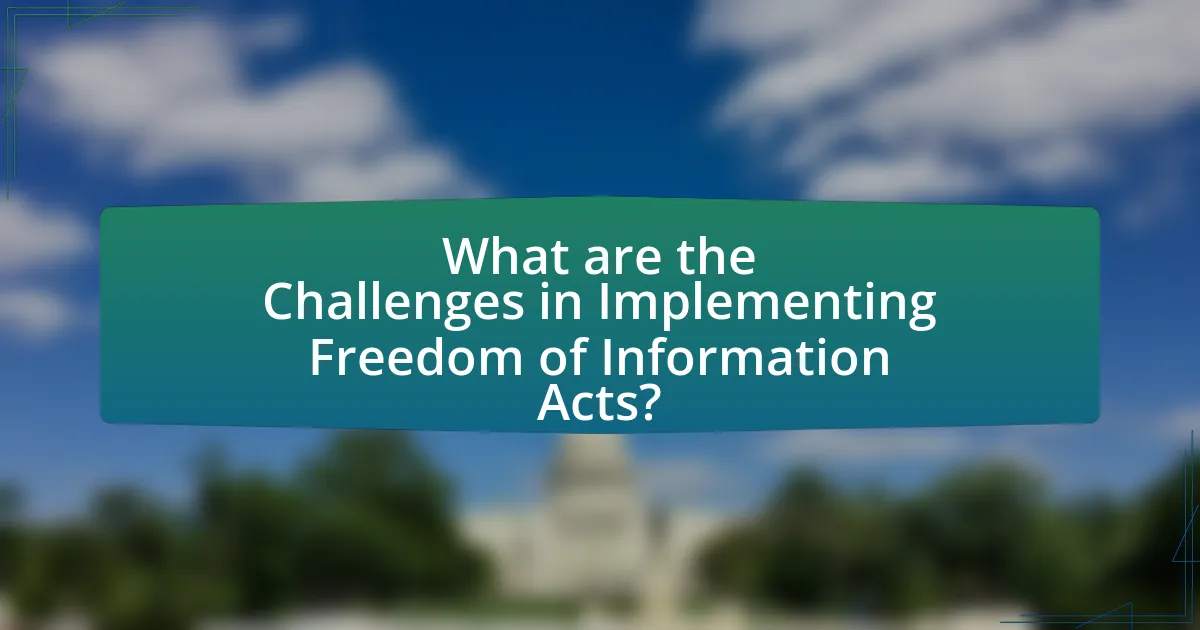
What are the Challenges in Implementing Freedom of Information Acts?
The challenges in implementing Freedom of Information Acts (FOIAs) include bureaucratic resistance, lack of public awareness, and inadequate resources for processing requests. Bureaucratic resistance often stems from a culture of secrecy within government agencies, which can lead to delays or outright refusals to provide information. A study by the Open Government Partnership highlights that many officials view transparency as a threat to their authority, resulting in pushback against FOIA requests. Additionally, public awareness of FOIA rights is often low, limiting citizen engagement and the effectiveness of these laws. According to a report by the Pew Research Center, only 29% of Americans are familiar with their right to access government information. Lastly, many agencies lack the necessary resources, including trained personnel and funding, to efficiently handle requests, as noted in a survey by the National Freedom of Information Coalition, which found that 60% of state agencies reported insufficient staffing to manage FOIA requests effectively.
What common obstacles do countries face in enforcing these acts?
Countries commonly face obstacles such as lack of political will, inadequate resources, and insufficient public awareness in enforcing Freedom of Information Acts. Political will is often undermined by governmental resistance to transparency, as seen in countries where leaders prioritize control over information. Inadequate resources, including insufficient funding and trained personnel, hinder the implementation of these acts, as evidenced by reports indicating that many agencies lack the capacity to process requests efficiently. Additionally, insufficient public awareness about rights under these acts leads to low utilization, which is highlighted by studies showing that citizens in many nations are unaware of their ability to request information.
How do bureaucratic inefficiencies impact access to information?
Bureaucratic inefficiencies significantly hinder access to information by creating delays, increasing complexity, and fostering a lack of transparency. These inefficiencies often manifest in slow processing times for information requests, as seen in various countries where Freedom of Information Acts are in place. For instance, a study by the Open Government Partnership found that in some jurisdictions, response times can exceed the legally mandated limits, leading to frustration and reduced public trust. Additionally, convoluted procedures and excessive red tape can discourage individuals from pursuing information, ultimately limiting the effectiveness of transparency initiatives.
What are the implications of legal loopholes in these acts?
Legal loopholes in Freedom of Information Acts (FOIAs) can significantly undermine transparency and accountability in government operations. These loopholes often allow public officials to withhold information under vague exemptions, which can lead to a lack of public trust and hinder informed citizen participation in democratic processes. For instance, a study by the Center for Effective Government found that 60% of requests for information were denied or ignored due to such loopholes, illustrating how they can obstruct access to vital information. Consequently, the presence of legal loopholes can perpetuate a culture of secrecy, ultimately diminishing the intended effectiveness of FOIAs in promoting open governance.
How do cultural attitudes affect the effectiveness of Freedom of Information Acts?
Cultural attitudes significantly influence the effectiveness of Freedom of Information Acts (FOIAs) by shaping public perception and engagement with transparency initiatives. In societies where there is a strong belief in government accountability and citizen rights, FOIAs tend to be more actively utilized, leading to higher rates of information requests and compliance from public authorities. For instance, in Scandinavian countries, where trust in government is high, FOIA usage is robust, resulting in effective information dissemination and public engagement. Conversely, in cultures with a prevailing mistrust of government or where secrecy is normalized, such as in some authoritarian regimes, FOIAs may be underutilized, leading to limited access to information and ineffective implementation. This disparity illustrates how cultural context directly impacts the operational success of FOIAs, as evidenced by comparative studies showing that countries with supportive cultural attitudes towards transparency achieve better outcomes in information access.
What role does public awareness play in the utilization of these acts?
Public awareness significantly enhances the utilization of Freedom of Information Acts (FOIAs) by empowering citizens to request information and hold governments accountable. When the public is informed about their rights under these acts, they are more likely to engage with the process, leading to increased transparency and responsiveness from public authorities. For instance, studies have shown that in countries with higher public awareness of FOIAs, such as Sweden, there is a greater number of information requests filed, resulting in more effective governance and public trust. This correlation underscores the importance of education and outreach in maximizing the impact of FOIAs.
How do societal norms influence the demand for transparency?
Societal norms significantly influence the demand for transparency by shaping public expectations regarding accountability and openness from institutions. When communities prioritize values such as honesty, integrity, and civic engagement, they tend to advocate for greater transparency in government and corporate practices. For instance, in countries where democratic values are deeply ingrained, citizens often push for robust Freedom of Information Acts, reflecting their belief that access to information is a fundamental right. Research indicates that societies with higher levels of trust in institutions also exhibit stronger demands for transparency, as seen in Scandinavian countries, where transparency is linked to lower corruption levels and higher public satisfaction. Thus, societal norms directly correlate with the level of demand for transparency, influencing legislative frameworks and institutional behaviors.
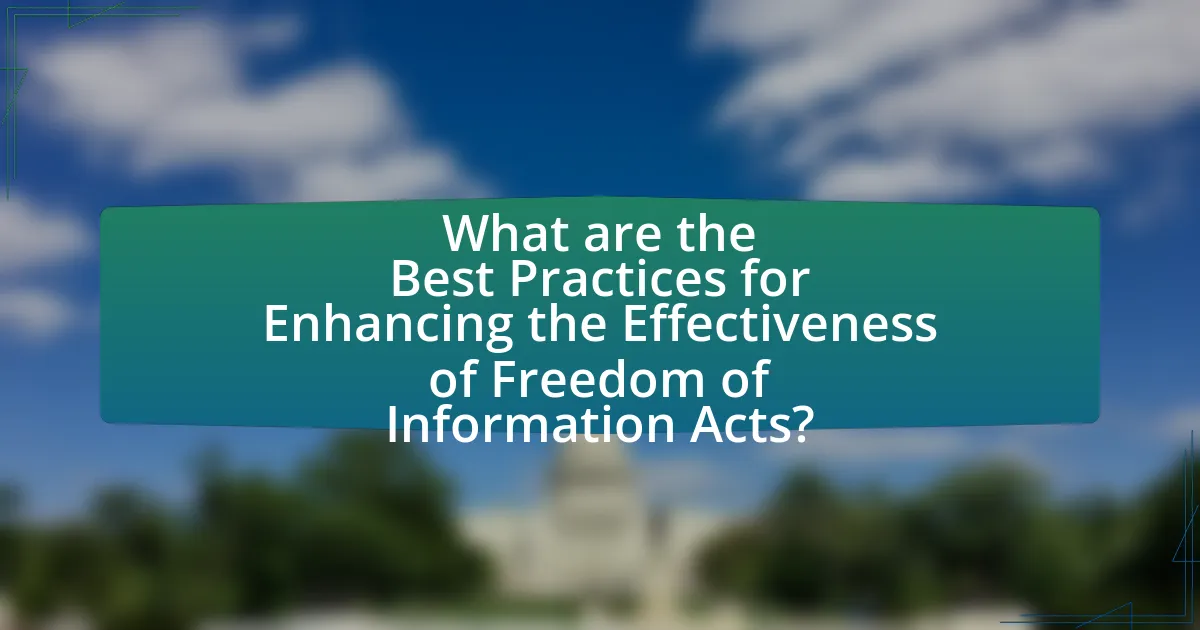
What are the Best Practices for Enhancing the Effectiveness of Freedom of Information Acts?
Best practices for enhancing the effectiveness of Freedom of Information Acts (FOIAs) include ensuring proactive disclosure of information, simplifying the request process, and providing adequate training for public officials. Proactive disclosure involves making information readily available without the need for requests, which increases transparency and reduces the burden on agencies. Simplifying the request process, such as using online portals and clear guidelines, facilitates easier access for citizens. Training public officials on FOIA compliance and the importance of transparency fosters a culture of openness. These practices are supported by studies indicating that jurisdictions with proactive disclosure and streamlined processes experience higher public trust and engagement in government activities.
What strategies can governments adopt to improve access to information?
Governments can adopt several strategies to improve access to information, including implementing robust Freedom of Information (FOI) laws, enhancing digital platforms for information dissemination, and providing training for public officials on transparency practices. FOI laws, such as those in Sweden and Canada, establish a legal framework that mandates government transparency and allows citizens to request information, thereby promoting accountability. Additionally, investing in user-friendly digital platforms can facilitate easier access to public records and data, as seen in countries like the United Kingdom, where the government has developed online portals for information requests. Training public officials on the importance of transparency and the proper handling of information requests can further ensure compliance with FOI laws and foster a culture of openness within government institutions.
How can technology facilitate better implementation of these acts?
Technology can facilitate better implementation of Freedom of Information Acts by enhancing transparency and accessibility of information. Digital platforms enable governments to publish data online, allowing citizens to easily access public records and information requests. For instance, automated systems can streamline the process of submitting and tracking requests, reducing response times and improving compliance rates. A study by the World Bank in 2020 found that countries utilizing online portals for information requests saw a 30% increase in citizen engagement and satisfaction with government transparency. This demonstrates that technology not only simplifies the process but also fosters a more informed and engaged public.
What role does training for public officials play in enhancing effectiveness?
Training for public officials plays a crucial role in enhancing their effectiveness by equipping them with the necessary skills and knowledge to perform their duties efficiently. Effective training programs improve decision-making, increase transparency, and foster accountability, which are essential components of good governance. For instance, a study by the World Bank found that training in information management significantly improved the ability of public officials to handle requests under Freedom of Information Acts, leading to better public service delivery and increased citizen trust. This evidence underscores the importance of targeted training in enhancing the overall effectiveness of public officials in their roles.
What lessons can be learned from successful Freedom of Information Acts worldwide?
Successful Freedom of Information Acts (FOIAs) worldwide demonstrate the importance of transparency, public engagement, and robust enforcement mechanisms. These acts have shown that clear guidelines for information requests empower citizens and promote accountability in government. For instance, Sweden’s Freedom of the Press Act, established in 1766, is one of the earliest examples, illustrating that long-standing legal frameworks can foster a culture of openness. Additionally, countries like Canada and the United Kingdom have implemented proactive disclosure policies, which require public bodies to publish certain information without waiting for requests, thereby enhancing accessibility. The effectiveness of these FOIAs is often linked to strong oversight bodies that can address complaints and ensure compliance, as seen in the United States with the Office of Government Information Services. Overall, the lessons learned emphasize the need for clear legislation, proactive information sharing, and effective enforcement to maximize the benefits of FOIAs.
Which countries serve as models for effective implementation?
Sweden and Finland serve as models for effective implementation of Freedom of Information Acts. Sweden was the first country to adopt a Freedom of Information law in 1766, establishing a strong precedent for transparency and public access to information. Finland, with its comprehensive Act on the Openness of Government Activities enacted in 1999, emphasizes proactive disclosure and citizen engagement. Both countries consistently rank high in global transparency indices, demonstrating the effectiveness of their laws in promoting accountability and public trust.
What specific measures have proven successful in these countries?
Successful measures in countries with effective Freedom of Information Acts (FOIAs) include the establishment of clear guidelines for information requests, robust training for public officials on transparency, and the implementation of proactive disclosure policies. For instance, Sweden’s FOIA, enacted in 1766, mandates that government documents are accessible to the public, fostering a culture of transparency. Additionally, Canada’s Access to Information Act has been strengthened by the introduction of online request systems, which increased public engagement and streamlined the process. These measures have led to higher compliance rates and improved public trust in government institutions, as evidenced by surveys indicating increased citizen satisfaction with government transparency in these nations.
What practical steps can citizens take to utilize Freedom of Information Acts effectively?
Citizens can effectively utilize Freedom of Information Acts (FOIAs) by following specific steps: first, they should identify the information they seek and ensure it falls under the purview of the FOIA. Next, citizens must familiarize themselves with the specific FOIA regulations applicable in their jurisdiction, as these can vary significantly. After understanding the regulations, they should draft a clear and concise request, specifying the information sought and including any necessary details to facilitate the search. It is also crucial for citizens to keep a record of their requests and any correspondence with the agency. Additionally, they should be aware of their rights regarding appeals if their requests are denied, as many jurisdictions provide a formal process for challenging such decisions. According to the U.S. Department of Justice, approximately 90% of FOIA requests are processed within the statutory timeframe, highlighting the effectiveness of well-structured requests.
